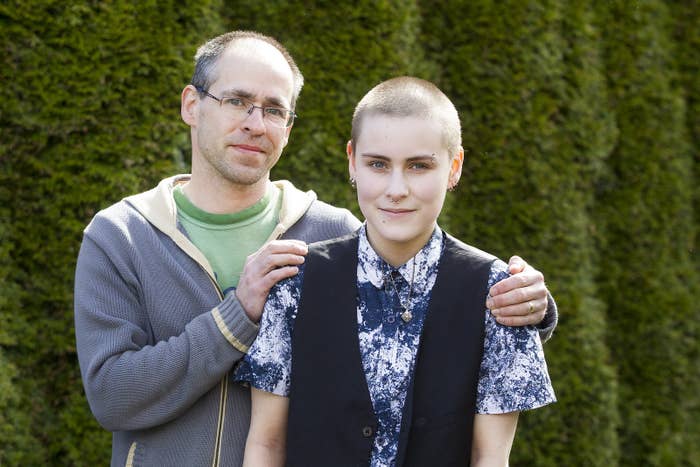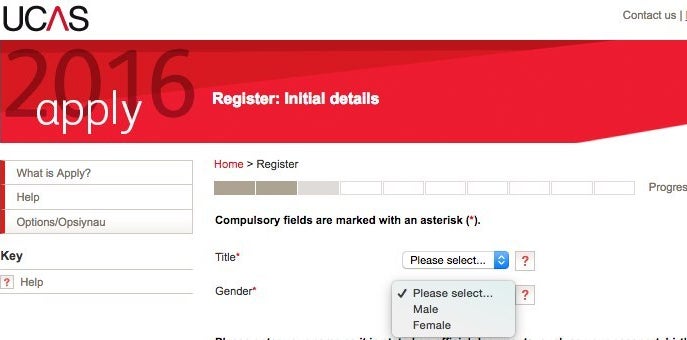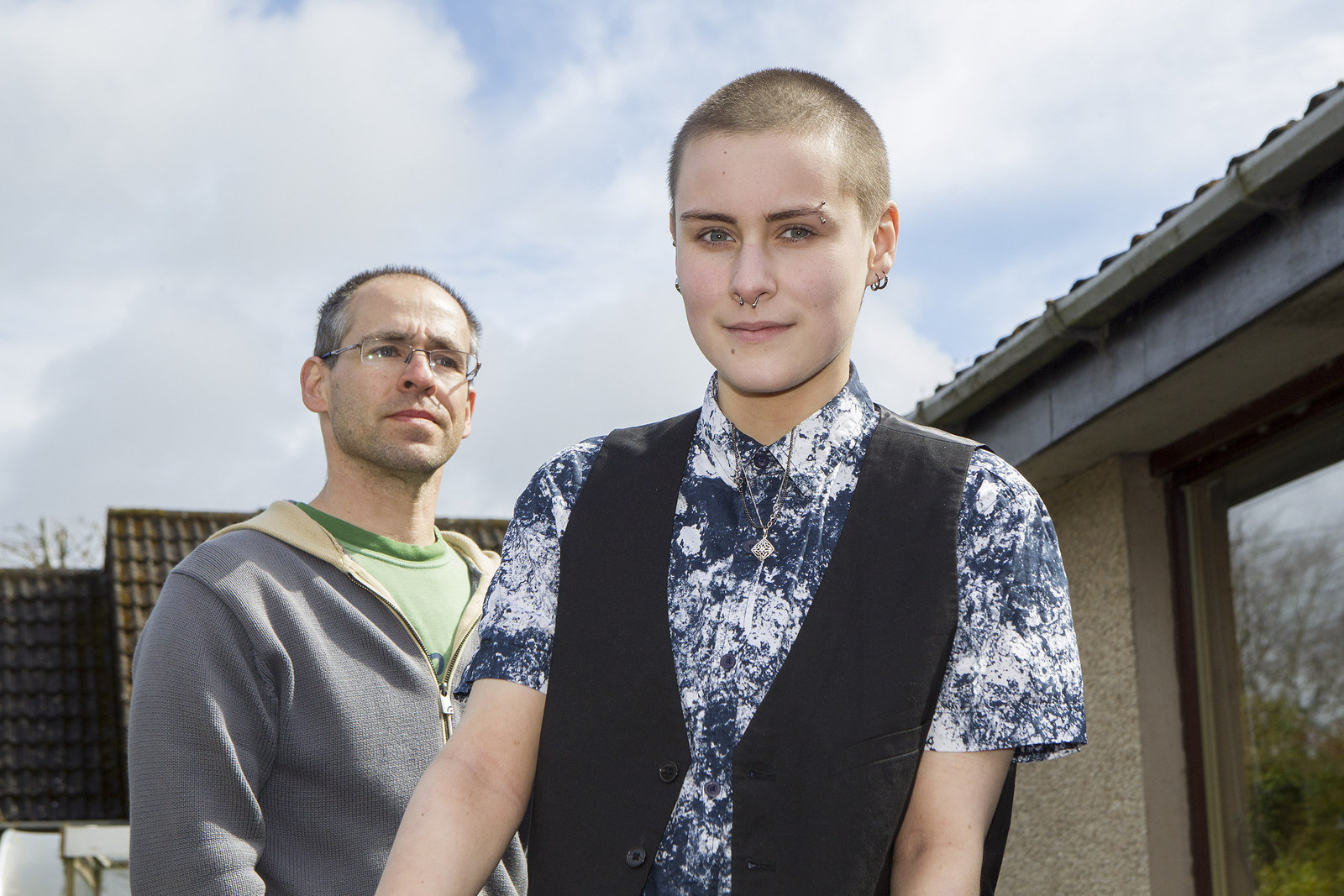
The father of a 17-year-old student is campaigning to change Britain’s banks because he cannot find one that will give his child, who identifies as genderqueer and non-binary, an account – because all the online application forms require customers to be either male or female.
Keith Farnish, 45, told BuzzFeed News that he and Kaelin, who live in a small village in the Scottish Borders, have gone to bank after bank in a quest to find just one that will allow them to join up without having to tick one of two gender boxes.
“When you’re filling something in and you don’t identify as male or female and you only see those two boxes then you don’t see yourself there,” said Farnish. “You are absent. That must hurt, and that’s what makes me angry. There’s no reason for it. It doesn’t need to be like this.”
Their attempts to open an account came during a wider mission to reconcile all official documents relating to Kaelin – who uses the pronouns “they”, “their”, and “them” – that exposed another barrier for anyone who doesn't identify as male or female: You cannot apply to university unless you tick one or the other.
But it was their battle with banks that prompted the Farnishes to speak out. Kaelin needed a new account because their existing one used the female name they were given at birth, which has since been changed by deed poll – and, said Kaelin, in order that that they could pay the deposit for their university accommodation in September. They first approached the Co-operative Bank – widely seen as a progressive alternative and the bank their dad has been with for years.
“The online form said male or female," said Farnish, "and had all the standard titles" – i.e. Mr, Mrs, Miss etc. Many non-binary and transgender people prefer the title Mx instead, as it doesn't denote a gender, but this was not an option, he said. Initially, Kaelin took action.


“I phoned them up,” Kaelin told BuzzFeed News. “And the guy said, ‘We’ll get back in touch with you within two weeks, because someone else has complained about this as well. But I got nothing back from them.” Then Kaelin’s father intervened.
“I made a formal complaint,” said Farnish. “I got a letter back from the Co-op and the essence of it was, ‘We’re going to have to spend money [changing this] so we’re not going to.’”
Disappointed, they abandoned the Co-op, hoping to find success elsewhere. While Kaelin was at school, Farnish looked up First Direct online, found the same problem, and then phoned the bank, asking if it would allow Kaelin to register without registering as male or female.
“The person I spoke to was like, ‘We could look into it.’ And I said, ‘Well, what’s the position now?’ [And they replied,] ‘We can’t do that at the moment, but if you want you could do something over the phone where you have to put male or female initially and then afterwards we can take it off. But you can’t do it online.’”
Farnish said: “A lot of people will try to sign up and yes, they too could go into branches and perhaps do some kind of fudge and work it out somehow, but that’s not how it should work. That is not equality.”
And so Farnish set about looking for alternatives, hoping that with so much choice in personal banking there must be one that did not discriminate against non-binary people. He searched through seven more online bank account application forms.
“Barclays," he said. "HSBC. Santander. Halifax. TSB. And Lloyds. Every single one requires gender to be male or female. Why are they collecting this information at all? Why is gender important? There are other ways of identifying people.”
Only the Royal Bank of Scotland, which was holding Kaelin’s old account, would allow an application without gender. But, said Farnish, even then the bank does not allow for Mx as a title, and they will still have to go into the branch to change the name.
“It’s another reminder,” said Kaelin. “A reminder that you’re different. But I don’t think I’m particularly different to other people – I just don’t fit male or female, I drift somewhere in the middle. So going on to the websites and seeing that, it’s disheartening. Even people who haven’t grasped the concept of non-binary or haven’t met anyone who’s non-binary will know that transgender people exist.”

Not being able to find a bank account might not seem on its own like a crucial issue, said Kaelin’s father, but is indicative of a world that demands a strict divide down gender lines, making life, in countless everyday ways, difficult for anyone who falls between those lines.
“It’s not life and death,” he said. “But, actually, embracing your identity and being comfortable in that identity? In many cases it is.”
The timing was particularly unfortunate. Kaelin came out to their family and friends in March last year and after changing their name wanted to ensure that every official file had their new name and reflected their correct gender identity.
“It was a new start,” said Kaelin. “Like, I’m going to leave the old me behind and everything’s going to be fine. But then it just hit a brick wall at the first hurdle.”
There have been other walls for Kaelin. In particular, when applying to university through UCAS (the University and Colleges Admissions Service), which runs the application system for higher education.
“You have to pick male or female,” said Kaelin about what happens when you sign up. “I complained to my school, who got in touch with them, and I’ve emailed a couple of times.” But, they said, it didn’t work.

“Kaelin ended up ticking the male box, because if you want to go to university you have to say you’re male or female,” said Farnish, who stepped in again, contacting UCAS in a bid to help his child. But this time he came armed with something else.
“I ripped the code off [the UCAS website], I rewrote it – it took me a minute to do another box. I then tweeted it back to them and said, ‘This is what it can look like.’ No response.” Farnish said he also discussed the situation with UCAS, but, “They basically said, ‘We’re not going to do it, because it’s too difficult.’” The UCAS online application does now allow for Mx as a title, but still asks applicants to check the male or female box.
For Farnish, attempting to overcome these obstacles for the sake of Kaelin is his duty as a father.
“I’m a parent that cares,” he said. “As far as I’m concerned whatever my child does, I will support them, and something as fundamental as their identity – it’s who they are – how can I deny that? How can I not want to defend that to the hilt? I would like Kaelin to be seen as a person and not be judged for who they are.” There are wider implications, too, he said.
“People are people. It shouldn’t matter who you’re attracted to, it shouldn’t matter what the contents of your pants are, none of this should make any difference. Gender is more than just what’s between your legs. We have to take the whole person into account.”
Farnish admitted that for him and Kaelin’s mother, there was an adjustment process when their child came out last year – learning, for example, to use “they” rather than “she”.
“It takes a while to get your head round, but actually none of this is a big deal, or should be a big deal,” he said. “It’s a steep learning curve for parents to see your child, someone you’ve always known, as a particular identity and to see that – as far as you’re concerned – changed. But as far as the trans person is concerned, they’re simply being who they always were.”
Kaelin, to whom BuzzFeed News spoke separately, echoed this.

“It took a couple of months for them to come to terms with everything,” said Kaelin. “It was like a whole new thing they hadn’t experienced before, so it was a bit of a shock – but I came out originally as bisexual when I was 12 or 13, so they’ve known I was a bit queer for quite a while! And they’ve been wonderful. It’s a shame some people don’t receive the same amount of support.”
Kaelin remains optimistic, however, as despite their experiences with banks and UCAS, some organisations have responded well to requests to change personal details.
“I’ve managed to change my name at my GP. They still use my biological sex – that’s understandable from a medical point of view – but my title has been changed from Miss to Mx. And I’ve talked to my GP about my gender and she’s like, ‘Yeah, cool.’ That was good.”
Kaelin has also found people at school to be “generally supportive”, although "most people don’t use the correct pronouns for me. But hey, we’re getting there.”
And as Kaelin grapples with the reactions of other people and the responses of institutions, they are keen to point out the positives elsewhere to being out as non-binary.
“I’ll meet someone and talk to them and notice I’ve completely messed with what they thought the whole of society was based on,” said Kaelin. “I had a 10-year-old come up and say, ‘Are you a boy or a girl?’ And I said, ‘I’m neither.’ And his jaw dropped to the floor and was like, ‘What? You can be that?’ Also I’ve had people come up and say they don’t feel comfortable identifying as something, or they’re wanting to change pronouns, and being able to give that support is cool. It’s not all sadness and confusion.”
Kaelin’s dad will continue fighting on their behalf until the world accepts his child as he does. Farnish said he wants “a complete sea change” in the way banks and other organisations operate. “I would hate to be in their situation,” he said. “Maybe in a few years' time it will be a lot easier. I would like Kaelin to be just be seen as a person and not be judged for who they are.” He stopped for a moment to consider what judging others means, and when it is justified.
“There is no cause for judgment unless you’ve committed a crime."
A spokesperson for the Co-operative Bank told BuzzFeed News: "Regrettably, due to system restrictions we aren't yet able use MX titles when opening customer accounts but we can amend their title on debit cards and other correspondence on request once the account is set up.”
Ben Jordan, senior policy executive at UCAS, said: “We already offer the gender neutral ‘Mx’ as a Title option and this is just the starting point for us. UCAS is currently re-developing its Apply service, and as part of this, we will be adding further options for answering the ‘Gender’ selection question, beyond ‘male’ and ‘female’.”
First Direct told BuzzFeed News: "We work hard to promote gender diversity right across the bank, and are currently working on plans to include other gender options in our application processes in the near future."
